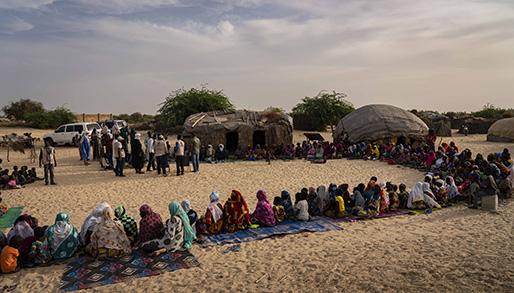In 2023, the EU has allocated €26 million for humanitarian aid in the country.
The EU has provided more than €472 million in humanitarian aid in Mali since the beginning of the crisis in 2012. It is currently a leading donor of assistance in the country.
In 2021, EU humanitarian aid amounted to €36.5 million. In 2022, we increased our humanitarian funding to Mali to €47.3 million. This included an indicative amount of €6 million from the European Development Fund to alleviate the food crisis following Russia’s war of aggression against Ukraine.
EU humanitarian aid in Mali addresses the most urgent needs of displaced and vulnerable populations in conflict-affected and fragile areas. The EU considers the protection of civilians as a central focus of our needs-based and conflict-sensitive response.
Our assistance covers (i) food, (ii) basic essential items/ emergency shelter, (iii) health and nutrition – including access to primary and secondary health care –, (iv) protection assistance and psychosocial support, (v) education for children, and (vi) humanitarian coordination and access to remote locations for humanitarian workers.
To assist people displaced by conflict, EU-funded aid organisations operating through the Rapid Response Mechanism provide initial, multi-sectoral assistance. This assistance includes food and essential items, water, sanitation and shelter support.
Other EU-funded organisations provide protection but also health care and education services. Where and when possible, assistance is delivered through cash transfers and vouchers to enable people in need to buy what their households require the most.
Most health services in the north and parts of central Mali depend on humanitarian organisations. The EU funds around a third of the health facilities delivering essential care and medicines.
During the COVID-19 pandemic, EU-funded humanitarian projects in Mali have adapted their procedures to ensure the safety of beneficiaries and staff, while maintaining the delivery of vital assistance to vulnerable communities.
Every year, the EU contributes to treating severe acute malnutrition across the country. We fund the purchase and supply of therapeutic food and essential medicines for children suffering from this type of undernourishment.
The €86 million invested in nutritional care between 2011 and 2021 provided life-saving treatment to around 700,000 severely malnourished children.
To access hard-to-reach areas in Mali’s northern and central parts, the EU operates its humanitarian air service, transporting humanitarian workers and relief assistance for people in need. In complementarity with this service, the EU contributes to the UN’s Humanitarian Air Service (UNHAS).
EU humanitarian and development aid work together in Mali. We aim to ensure coordination between actions addressing immediate humanitarian needs and projects that tackle the root causes of crises. With EU aid, people in need build resilience to recurrent crises with time, making them less vulnerable in the future.
Last updated: 06/02/2023



